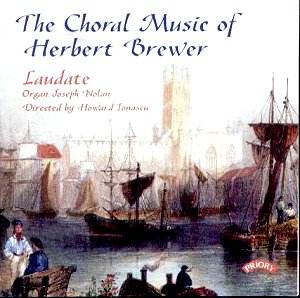Brewer was organist at Gloucester Cathedral for over
thirty years, from 1896 until his rather sudden death in 1928. He
was a friend of Elgar's and his own works do show, later on, a distinct
Elgarian influence. Brewer spent almost his entire life in Gloucester
and, once established, he composed works for the Three Choirs Festival,
directing all those held in his native city, encouraged contemporary
works and was also active as an orchestral conductor.
His own compositions presented here are attractive, melodic,
frequently striking but also occasionally rather four square.
They range from the early Magnificat and Nunc Dimittis in D of
1894 to the much later setting of it in 1927 and this later work
is by far the more imaginative, showing the decisive influence
of Elgar on Brewer's writing. Let the People Praise Thee is a
slight setting dating from just after the end of the First World
War but it does contain a most sensitive middle section, and a
degree of elasticity that compels attention. As the Hart Pants
was written in 1917 and, though short, is of exceptional delicacy.
It shares something of the withdrawn War spirit of the explicitly
melancholy 1916 setting of Bow down thine ear, O Lord. Brewer
can be colourful and exultant as well - Blessing, Glory, Wisdom
and Thanks is suitably bold with declamatory unison chordal flourishes
supported by deft organ writing and some contrastive unaccompanied
passages to lighten texture. Brewer oscillates between jaunty
insouciance and a thinning down of voices in O Death, where is
they Sting. There are few occasions where things sound awkward
or ungrateful to sing but there are places in God is our Hope
and Strength where this is the case but a setting such as Prevent
us, O Lord, written in the same year as Gerontius, reveals the
graceful delicacy Brewer could cultivate and that existed alongside
and within his more energetic public persona. The Magnificat in
C (1895) is a bold and big work with important roles for solo
sopranos and, indeed, at one point the choir divides into seven
parts.
Not everything is up to this level - O Lord God is plain dull
- but much is energetic and sprightly. He cultivates an unusually
antique air in the homophony of A Solemn Prayer and there is subtle
layering in the blisteringly Elgarian organ introduction of God
within (1928). We finish with the Magnificat and Nunc Dimittis
in D (1927) where Brewer takes these affiliations to ever more
nobilmente heights (he'd even written that word in the score of
God within) and where his declamation and also his sensitivity
are laudable.
Laudate are generally polished exponents. I think that sometimes
there is a lack of blend in the men that occasionally obtrudes
(it's most noticeable in Blessing, Glory, Wisdom and Thanks).
The Priory team have coped excellently with the acoustic of St
John's Church, Holland Road and John Bawden's notes are admirably
cogent and quite clear-eyed not starry-eyed about Brewer's place
in the scheme of things. Attractive if slight is probably a harsh
verdict but I'd put the accent on attractive.
Jonathan Woolf

![]() Laudate with Joseph Nolan
(organ)/ directed by Howard Ionascu
Laudate with Joseph Nolan
(organ)/ directed by Howard Ionascu![]() PRIORY PRCD 797
[76.58]
PRIORY PRCD 797
[76.58]